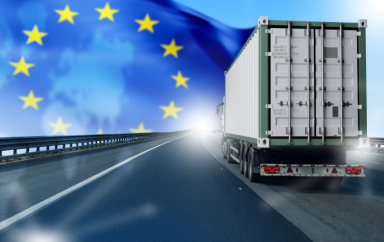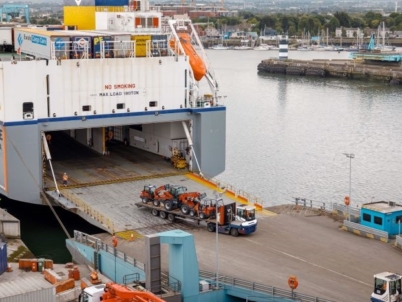-
Rite-Hite unveils new range of hydraulic kits to upgrade and extend dock leveller performance - 1 day ago
-
REWE and Cimcorp automate fresh supply chain for Berlin supermarkets and stores - 1 day ago
-
Q1 – A recovery period or time to fix, switch and scale? - 1 day ago
-
NULOGY’S SHOP FLOOR SOFTWARE TO POWER COMPLETE CO-PACKING’SOPERATIONS - February 13, 2026
-
Why lead generation depends upon good content - February 13, 2026
-
Wallapop and Albatross Sign Strategic Partnership to Bring Real-Time AI Discovery to the Future of Consumer-to-Consumer Commerce - February 12, 2026
-
Thorworld ramp helps Hubergroup to streamline its unloading operation - February 6, 2026
-
TRACKER INNOVATION FROM QUECLINK TO BOOST STOLEN VEHICLE RECOVERY PERFORMANCE - February 4, 2026
-
Flexi Narrow Aisle hits 50! - January 29, 2026
-
DERRY BROS ATTRACTS RECORD NUMBERS OF FREIGHT CUSTOMERS SEEKING CUSTOMS SUPPORT - January 29, 2026
International freight businesses will need to adopt greater levels of digitisation, automation and electronic reporting to comply with incoming UK and EU customs requirements or face severe consequences in terms of added costs, delays and operational risk. This is the view of Sarah-Louise Murray, Customs Manager at leading customs clearance specialist, Derry Bros, who warns some operators will be in for a shock as many processes that work today may be insufficient in 2026 and beyond.
“Businesses involved in the international movement of goods will increasingly need to move away from manual and paper dependencies, while also investing in data integrity, internal compliance systems and audit-reporting, to prepare for planned and future amendments,” explains Sarah-Louise Murray. “Keeping on top of these proposed UK and EU changes will be key to avoiding business and operational disruption, while maintaining competitiveness.”
As well as the delayed introduction of the EU’s Import Control System 2 (ICS2) Phase 3 and France’s Enveloppe Logistique Obligatoire (ELO), now both planned for early 2026, there will be a host of other customs changes that freight operators will need to consider and prepare for. This means the margin for error to ensure goods are not delayed or refused entry at EU or UK borders is rapidly shrinking, while at the same time the threat of stricter fines and penalties grows.
In the UK, companies will be granted free, self-service access to their customs declaration data from March 2026, the same information HMRC looks at. The shift means expectations on internal compliance and data integrity will rise, with organisations held accountable to spot errors proactively, so it will be crucial to have clean, auditable customs systems.
Under recently published UK statutory amendments (Customs Miscellaneous Amendments 2025), there are also several forthcoming changes to how declarations, temporary admissions, and oral / “by conduct” declarations operate. Additionally, the HMRC 2025–26 transformation roadmap signals further automation, digitalisation, and a push toward transparency and predictive compliance.
Meanwhile, France will abolish limited/ad hoc fiscal representation under Regime 42 for non-EU businesses. This is one of the more painful ones for UK companies currently relying on fiscal representation shortcuts as a full VAT registration and full tax compliance obligations will now be needed. Moreover, some other EU jurisdictions may follow or impose similar stricter rules on non-EU sellers relying on representation or simplified regimes.
There are also longer-term changes in the pipeline that will need systems to provide real-time chain-of-custody, risk metrics, and data transparency. The EU is driving a customs reform that introduces a single EU Customs Data Hub and a new EU Customs Authority. The vision is for data to be submitted once into a unified environment, so risk analysis is undertaken by the customs authorities and clearance is based on trust and classification, with minimal intervention on low-risk flows. Over time, “trusted” traders may benefit from near-automatic clearances with limited active customs checks.
“There is a growing realisation that international freight businesses will need to adapt to survive, with those operators constrained by paper-based systems or leaving preparations for incoming changes until the last minute facing significant risk. We are using our longstanding customs expertise to provide guidance and support to help customers adapt their procedures or implement software integrations, so they can avoid any supply chain issues, loss of business and damage to their reputation,” adds Sarah-Louise Murray.
Derry Bros has more than 60 years of experience in the freight and logistics industry, serving the UK, EU and beyond. With a comprehensive range of managed booking, customs and consultancy services, it is helping businesses to navigate some of the most complex challenges facing cross-border trade and transport. The company’s success and proven track record is underpinned by award-winning technology systems, developed in-house, including the all-in-one digital customs solution, Digicom.

































